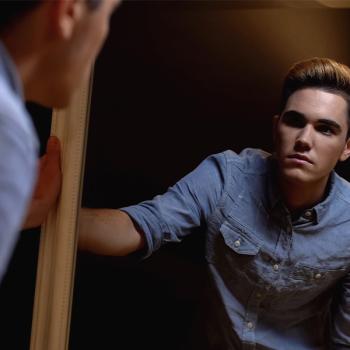“If you’re White, please don’t @ or email me.”
I shared this attempted line of cautionary humor some years ago during a sermon on structural racism one Sunday morning. I sought to make a clear distinction between the ideology of white supremacy and white people—hence the cautionary word to white people in my congregation. White supremacy—I explained—was a destructive ideology that inhabits all kinds of people in different ways. But in my flippancy, much seemed to be lost in translation. This attempted line of humor in a sermon led to a series of meetings in the weeks to come.
I would come to hear of an email sent by a white congregant to many leaders that didn’t include me, the lead pastor (I did tell white people not to email me after all.) In the email, I was accused of being a left-leaning socialist (evangelical speak for “heretic.”). I made an appointment to sit with this congregant over breakfast at the local diner, seeking to better understand her, clarify my quip, and move towards some semblance of understanding. There were moments when the spoon I stirred my coffee with clanked a bit too hard against the mug as this congregant shared her concerns—these conversations produce some level of anxiety in me. But ninety minutes later, she felt better. So did I.
That lasted…for a month.
I would preach again about the ills of systemic injustice, highlighting the reality of mass incarceration and the impact it has on Black and Brown people. A few days later, sadly, the congregant would make her final exit.
Two months later, I found myself having breakfast with another congregant. A wonderfully kind person. This congregant immigrated into the United States many years prior from China. He had a thriving business and proudly displayed the American flag on his lawn. He heard me critique the American Dream and highlight the historical sin of slavery. It was much too negative of a sermon for his taste. He came to church to be uplifted.
He asked to meet with me to share his thoughts. Another appointment was set up, adjacent to the spot that I met with the white congregant. He chided, “Pastor Rich, if you knew what life was like for my family and me in my country of origin, you would be more grateful to live in this country.” My spoon clanked a bit too hard again, betraying the composure I tried to exude.
It’s not easy being a pastor of a church in this cultural moment. The congregation I lead has more than seventy-five nations represented in Queens, NYC. Half of Queens is foreign-born, and our congregation reflects this beautiful social reality. But things get lost in translation from time to time—especially when the topic is racism. People struggle to see the bigger picture, and by “the bigger picture,” I’m referring to the many layers that make up this conversation—which is what I want to explore in this article.
Whether you are religious or not, a church-goer, or a church avoider, there’s much that can be learned from our multi-ethnic, multi-racial, international community. In conversations around this matter, I’ve learned that any approach in understanding the scope of the racialized world we live in must be addressed on different levels.
There’s no silver bullet to fixing racism in the United States or anywhere else. But we can’t bring healing without seeing the big picture.
Has my approach worked? Yes…and no.
It’s worked insofar that many in our congregation have deepened their understanding of the dynamics at work, which has helped them navigate the racialized world we live in more deftly. But for some, it has caused great concern, especially because so much has become politicized. There’s a widening emotional impasse in our society.
What I’ve come to learn over the years is that as a spiritual leader, I’ve needed to borrow from various disciplines in order to have a complete picture concerning the racial dynamics that concern us all. Whether or not you agree with this framework or the conclusions I arrive at, we all must reckon with a framework expansive enough to move beyond the stalemate that is race relations.
The two questions I’m regularly wrestling with are:
1. Are we seeing the bigger picture?
2. Are we cultivating a life to engage this issue?
As it relates to the “bigger picture,” I believe there are—minimally—six layers we need to work toward understanding. Here’s a brief synopsis of each:
Theology
In bringing up theology, I’m naming a layer that is meaningful to millions of people around the world. Christian theology has much to say about our racial moment. Let me highlight three overarching themes. First, the Bible as a whole offers a vision of God’s desire for humanity to flourish in relationship with its creator, and express that communion in the social relationships humanity is bound to. Second, the Bible clearly highlights—especially through the Hebrew prophets—that human sin is carried out in individual and institutional ways. The misuse of power is a recurring theme in the scriptures. Third, the urgent call from God in the scriptures is one of justice—the right ordering of society through the fair treatment of all. This is an important layer—especially for people of faith to reckon with.
History
In the church I pastor, we often say, “Jesus might live in your heart, but grandpa lives in your bones.” By this, we mean that history has a way of repeating itself, and to the degree that we are honest about where we’ve been, we will have satisfactory answers for where we are now and how to move forward. Becoming historians is a critical element of engaging matters of race with integrity.
Sociology
Sociological analysis helps us name reality by providing language and data to examine our racial estrangement. Whether one agrees with the sociological conclusions or not, it provides a thoughtful attempt to address matters of race with understanding the way is society is ordered. Beyond the data that reveals racial disparities, sociology helps us linguistically frame our current moment.
Policy
How are policies being shaped to reinforce inequalities in our world? How are resources being allocated to contribute to the common good? The issues of race require engagement—especially locally—to support policies that embody racial justice in our world. The call of faith traditions are to move society to a more just world. While this doesn’t mean everyone will civically engage the power structures of society equally, it does mean that racial justice needs larger, systemic implementation in the various spheres we find ourselves in.
Psychology
The layer of psychology in examining race requires concurrent attention on significant areas that undermine or support racial justice. On the one hand, many must do the work of processing trauma and grief stored in our bodies due to racial hostility and injustice. Moreover, the psychological examination related to the ways we have been socialized from our family of origin plays a pivotal role in working for peace and justice. Processing or own emotionality plays a significant role in the pursuit of healing.
Spirituality
For many, in the course of cultivating religious and spiritual habits, the societal fissures become more pronounced, and spirituality is seen as a tool to ignore the larger matters that shape the world. Spirituality—rightly conceived—is about ordering our lives in ways that move us towards God and our neighbor in love. That is, in the world we inhabit, good spirituality recognizes the inherent dignity of all people and strives—from a place of prayer, spiritual practices, and service—to move our world to a more just place.
I could go on in greater detail about each of these layers, but my point is this: unless we are examining race from a multilayered perspective, we will just spin our wheels, making little progress. Understanding an issue—especially an issue as complex as racism—in comprehensive ways is a precursor to responsibly addressing it and processing it together. As a pastor, this is my ongoing task—and our task together as citizens to hold these things complexities and layers together. In so doing, we can work from a more comprehensive vision of what racial justice entails.














